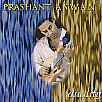Prashant Aswani: On "Revelation", I went for a raw vibe by only using guitar, bass, and drums. "Duality", however, was a much larger production. The compositions are more developed, with added textures and subtle nuances. It features electric and acoustic guitars, guitar synth, keyboards, bass, and drums. Rhythm has always been an important part of my playing. The new CD maintains the strong rhythmic focus found on "Revelation". This time I explored new melodic and harmonic concepts. The result is a more fusion-sounding album.
Prashant Aswani: The CD was recorded at Tilt Studios in Easton, PA. I used two Alesis ADATs.
Prashant Aswani: Greg Howe and I played an acoustic duet ("Order of Dawn"). Basically we came up with a groove in 3 and looped it. We recorded eight minutes of the
groove and just started working through the song and overdubbed our parts as we went along. Later we added in all the textures (guitar-synth, percussion, and strings). Greg also has one other guest solo on "Little Miss Lover", which is a Jimi Hendrix tune off "Axis Bold As Love". Al Howe sang on this track as well. This was the first time
I worked with Al. He can really sing! Working with him was a great pleasure, and I hope to do so again in the future.
Gian Marco Benvenuti, the keyboard player for my band in Italy, sent me a song idea. I took that idea and added a bunch of textures and melody and played with the arrangement. This is the song I end the album with and it is called "Q-sonic". Gian Marco is a phenomenal keyboard player.
Prashant Aswani: My ideas come from different rhythms and melodies that always flow through my head. When I'm in writing mode, the mediums I will use to replicate these ideas are bass, guitar, and guitar synth. I don't really have a set pattern for my writing. When I have to write for an album, I put everything aside and play as much as I can. Sometimes the ideas come very easily and other times I really have to dig deep for
them.
When I come up with a groove or a melody that I like I really try to build on that. Guitar synth and bass were helpful tools for me on this album. For me, the key is to just keep on playing because the more I play, the more my ideas turn into songs.
Prashant Aswani: Absolutely. I'm also planning on some vocal releases in the near future. I really love all styles of music, and voice has a key role in many of them. Of course, guitar will always be my first love, and I will always have the desire to showcase it.
Prashant Aswani: I enjoy collaborating with other musicians. I feel that music gets better with collaboration. I would love to work with Prince one day. His lyrics and his music are absolute genius. Another musician that I would love to work with is Zakir Huassain, an Indian percussionist. I really dig his style and the way he uses polyrhythms.
Prashant Aswani: The first music I was exposed to from childhood, was Indian classical music. Indian clasical music is very rich with melody. The first instrument I learned to play was tabla. Tabla gave me a strong sense of rhythm, which I kept when I started playing guitar. This early exposure to melody and rhythm has had a great impact on my writing and playing. I think this sets my music apart from the other guitar albums that are out there.
Prashant Aswani: Yes. I was just in the studio writing with some musicians from India; Ronu Majumdar (bamboo flute) and Abhijit Banerjee (tabla). The music is a fusion of Classical Indian music (ragas) with Western harmony and very modern electric guitar tones. We plan on recording an album some time this year. I am looking forward to this project because the music is very different from anything I have recorded before.

Prashant Aswani: There is a lot involved in being an independant artist. I have to thank my father who does the bulk of my representation. He has been a big help with the business side of things. When i am on tour or in the studio it is difficult to keep up with emails and phone calls. It is important to have good mangement to handle these kinds of things for you.
Prashant Aswani: I have done interviews with quite a few leading Japanese and European magazines. My experience with them has been very positive. As far as US magazines are concerned, it is hard for me to say how they are handling guitar-oriented music, because I haven't dealt with them much in the past. There just doesn't seem to be that much of a market for insturmental music in the US as there is overseas. I hope that will change in the future.
Prashant Aswani: To be honest I don't think about that very often. I am thankful that I am able to make a living and support myself with music. I try to focus on the present and not think too much about what will happen in the future.